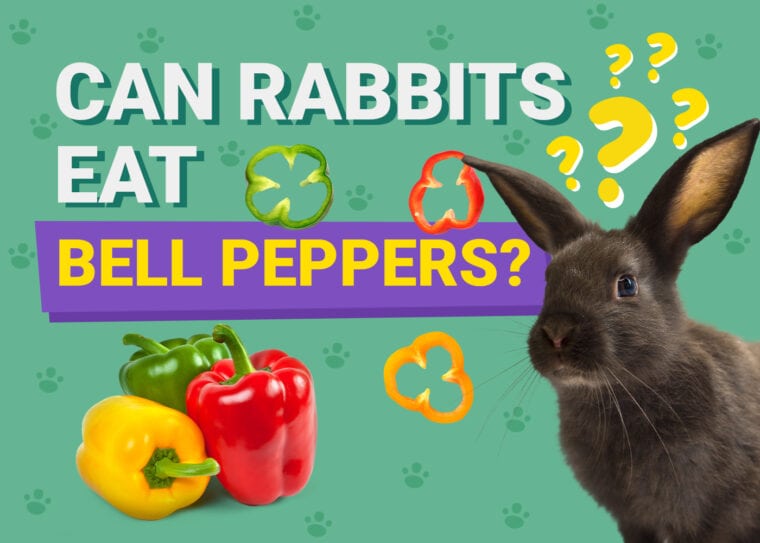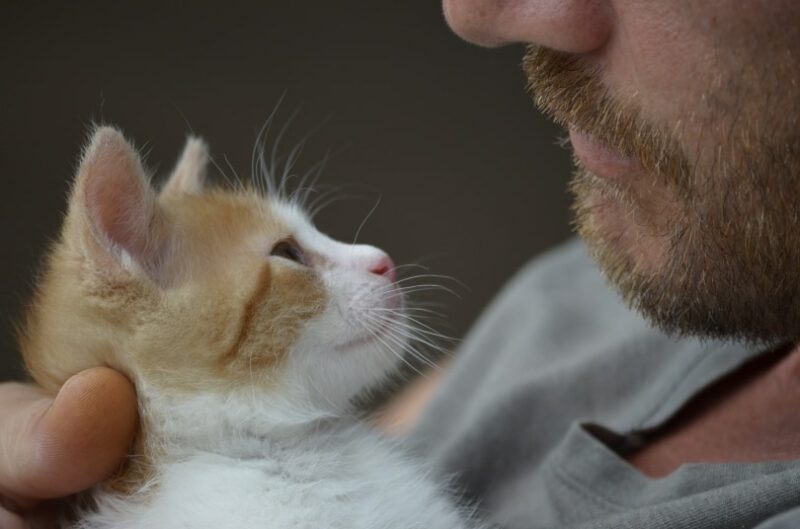
Choosing the right fresh vegetables to add to your pet rabbit’s diet can be a great way to round out their nutrition. While bunnies get most of their nutrients from fresh hay, adding a daily supplement of fresh greens and veggies will provide them with essential vitamins and minerals.
While most vegetables can help keep your rabbit happy and healthy, there are some that can be harmful or deadly. That’s why in today’s article, we answer the question “can rabbits eat bell peppers?” with a resounding yes. By the end of this guide, you’ll know everything you need to about how bell peppers affect a rabbit’s diet and health.
Yes! Rabbits Can Eat Bell Pepper

Bell peppers are a very healthy and bunny-friendly food. In fact, rabbits can eat bell peppers of every color. What’s more, most rabbits love the taste of these subtly sweet treats!
However, not all parts of a bell pepper are equally nutritious for your rabbit. To avoid causing your rabbit any gastrointestinal distress, continue reading to learn the best way to prepare bell peppers.
Bell Pepper Nutrition and Fun Facts
Did you know that red, yellow, and green bell peppers are all the same plant at different stages of ripeness? It’s true! Green bell peppers are picked while still immature, and the sweeter red peppers are fully grown. Orange bell peppers are an outlier and come from a slightly different plant species.
Bell peppers of every color are rich in Vitamins A, B6, and C, but red bell peppers have the highest concentration of nutrients. This comes at a trade-off for your rabbit’s health, though: Red bell peppers also contain more sugar, which is not good for your rabbit’s digestion. Meanwhile, green bell peppers have fewer vitamins, but higher fiber and less sugar.
Health Benefits of Bell Pepper for Rabbits
The vitamin B6 that is found in every color of bell pepper contributes to your rabbit’s healthy growth and cellular repair. It’s so important, in fact, that rabbits fed a diet without vitamin B6 experienced lower growth rates and death in about 100 days.
Every variety of bell pepper provides a rich source of vitamins and minerals that complement a rabbit’s usual diet well. With their low sugar content, green bell peppers make a useful addition to your rabbit’s weekly diet. The sweeter yellow and red varieties are more suitable as an occasional treat.

Can Bell Pepper Be Bad for Rabbits?
Because of rabbits’ complex and sensitive digestive systems, any food that is too high in sugar can cause serious gastrointestinal distress. So, while bell peppers can be an excellent source of vitamins and minerals for your rabbit, they are too sugary to form a bulk of your rabbit’s diet. In short, be careful not to overfeed your rabbit on bell peppers.
How to Feed Bell Pepper to Your Rabbits
From the seeds to the stems and flesh, no part of a bell pepper is toxic to your rabbit. However, the seeds, stems, and cores are harder to digest. We strongly recommend cutting your bell peppers into slices before feeding your rabbits and discarding the stems, cores, and seeds.
How Much Bell Pepper Should I Feed My Rabbit?
Any time you introduce a new food to your rabbit’s diet, you should do so slowly and gradually. Feed your rabbit only a few mouthfuls of bell pepper for their first time and monitor them closely for signs of indigestion. These can include diarrhea, bloating, lethargy, and constipation – all signs that you should immediately stop feeding bell pepper to your rabbit.
When your rabbit’s stomach has acclimated to bell peppers, consider feeding them a small handful per day as a supplement to their usual diet of hay. Green bell peppers can be fed in slightly larger quantities because of their lower sugar content. Keep your servings of yellow and red bell peppers to only once or twice per week because of their higher sugar content.
Types of Bell Pepper to Feed Your Rabbit
We always recommend choosing only organic produce, as this will avoid the waxes and pesticides that could make your rabbit sick.
Any color of bell pepper is fair game to feed to your rabbit, and they’ll appreciate having a variety to snack on. The classic “stop light” pack of red, yellow, and green is an excellent place to start, but you should also check your local farmer’s market for more exotic varieties. Your bunnies can also eat sweet pepper if they like the taste.
Final Thoughts
Safe in every color, bell peppers are an excellent addition to your rabbit’s diet. Look for organic peppers and remove their seeds, stems, and cores, and your rabbits are unlikely to have any digestive issues with their new food. Try out as many different hues as you can find – your bunny will love the gourmet experience!
Related Reads:









